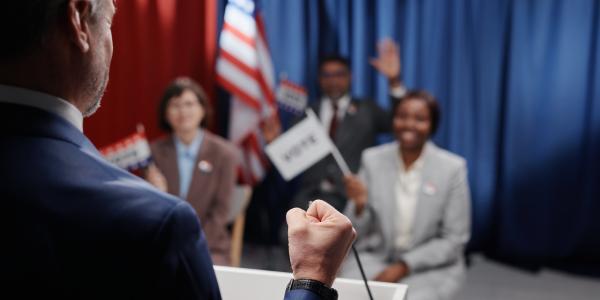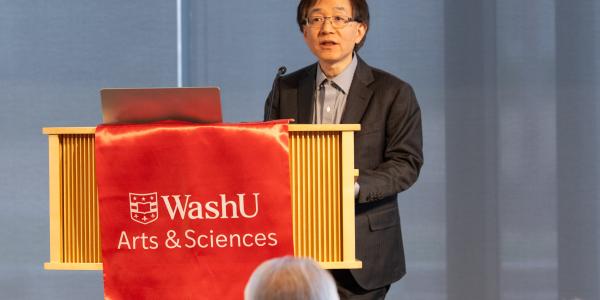A new study from WashU’s Department of Political Science points to the potential value of politicians’ unrealistic claims and agendas.
Every election season, politicians make promises they can’t or won’t deliver. Those pie-in-the-sky proclamations may seem disingenuous, but they play an important role in politics and policy, said Keith Schnakenberg, professor of political science.

In a paper published in the Journal of Theoretical Politics, Schnakenberg, along with graduate students Dahjin Kim and Gechun Lin, make the case that unrealistic promises can help provide important information to policymakers about the preferences of voters.
Overpromising is a common practice across the political spectrum and at every level of government, Schnakenberg said. In the current presidential campaign, for instance, Donald Trump pledged to make IVF treatments free for all couples, an improbable policy that would cost billions.
Likewise, Kamala Harris pledged to sign any bill that restored Roe v. Wade protections in all 50 states. Schnakenberg noted that such a bill is unlikely to reach the President's desk given current Congressional constraints. “Harris may not have the opportunity to sign a bill protecting abortion rights in all 50 states, but her stated desire to sign such a bill has already sent a message and shaped her potential agenda,” he said.

In their paper, Schnakenberg and his students looked at healthcare promises made by Democrats during the 2020 presidential primaries. In those campaigns, liberal candidates including Bernie Sanders and Elizabeth Warren advocated for “Medicare for All,” a government-run health insurance program that would cover all Americans. “Given the makeup of the Senate, it wasn’t plausible that such a law would ever be passed,” Schnakenberg said. “So those promises were a bit puzzling.”
To solve that puzzle, Schnakenberg, Kim, and Lin used principles of game theory to identify the upside of political promises. They found that promises — realistic or not — can provide important information about what voters really want. “If one of those candidates proposing ‘Medicare for All’ had actually won the primary, it would have told the political elites that this policy is actually very popular,” Schnakenberg said. “Promises like this provide an opportunity to learn.”

Promises are crafted to appeal to voters, but not all voters aren’t created equal. The researchers separated them into two categories: rational and credulous. Rational voters understand that certain promises will never become reality while credulous voters generally believe what politicians claim.
Credulous voters may eventually be disappointed, but they play a crucial role in the political process, Schnakenberg said. They vote as if the promises were plausible, providing valuable information about the policies and values they support. “Without credulous voters, you lose any learning potential,” Schnakenberg said.
The voice of credulous voters can be especially important around certain hot-button policy issues, Lin said. “Trump boasted that he would end the Ukraine war immediately if elected,” she said. “Such a policy goal could sound appealing to those credulous voters who blame the current administration for spending their money to fund a foreign war.”
It’s hard to say if voters today are more or less credulous than in the past, Schnakenberg said. Growing levels of partisan polarization and the resulting tendency to vote for certain parties under any circumstances makes it more difficult to discern what voters truly believe, he added.
“Different voters will understand the same promise differently," Kim said. "Some will think in terms of what can get done while others think in terms of what they want done.”
It’s not all about the voters, however. The team found that politicians have another audience in mind when they make promises: members of Congress and others with the power to turn promises into policies. Politicians thinking strategically about their claims on the campaign trail are likely already considering the future negotiations that will determine if they become a reality, Schnakenberg said. “They know there’s going to be bargaining down the line.”





